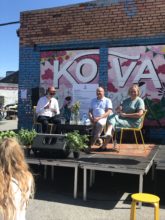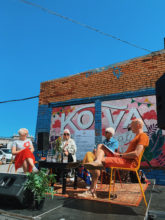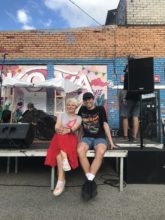On Saturday, the 25th July, hundreds of kind people gathered in front of Sveta bar to show their support for human rights and diversity in Estonia as well as be a part of some pleasant festival activities, a charitable art- and flea market and lively music. All this was part of the colorful one-day festival Ühine!
Thanks to the support of our sweet human rights ambassadors Saara and Keio, the Centre was also represented at the festival with our own info- and merchandise table. The day there went by busily, sharing informative materials and collecting donations: people were curious about our activities and many bought themselves human rights supporter’s shirts and socks. A few times our table was also approached by people who expressed skepticism regarding human rights, but with the help of a kind word and explanation, hopefully we were able to help them out as well. A big thanks to Saara and Keio, without whom the centre wouldn’t have been able to participate in the festival in such an extent.

Comprehensive and necessary discussions
The Centre’s lawyer Uljana Ponomarjova moderated a discussion titled “Does nationality have a personality?” The panel was attended by Irene Käosaar from the Integration Foundation and Jüri Allik from the Tartu University Institute of Psychology. The discussion was primarily about stereotypes and how they affect society and certain people. The attendees agreed that stereotypes mostly don’t conform to reality but often start to shape the way we live. A person’s identity however isn’t dependent only on their nationality but also the people around them, their environment, job, language barriers, and many other factors that change through the course of one’s life. Just as the world around us is constantly changing, so is our identity.

The Center’s expert Kelly Grossthal participated in the discussion “Can a work environment have respect for diversity, when it’s lacking in society?”, that was moderated by advocate Alari Rammo from the Network of Estonian Nonprofit Organisations. At the panel, the participants discussed the different effects of the work environment and society. Mare Heinluht from Swedbank acknowledged that their company’s basic virtues are clear, diversity being one of the core values. The center’s expert Kelly presented examples of how societal problems have made their way to the employers and the human rights center diversity consultant Reet Trei concluded that the biggest concern in today’s work market are biases regarding age.

A sincere thank you to the organisers and supporters of human rights!
The organisers of the festival had done a fantastic job, the audience was plentiful, and artists, who performed on stage, also shared heartfelt messages about human rights along with their music. The Sveta party in the evening could only be accessed by a donation to our center, which was another example of the amazing support of the development of human rights in Estonia from the organisers team.
By the end of the evening, the feeling was wonderful and warm. At a time when populists and right-wing representatives work hard to demean the importance of human rights, a group of young people come together and organise a compelling festival in support of human rights. Today, there are still no words to describe what happened and the eagerness of the youth nowadays. Human rights are not an ideology, human rights are a normal way of living where everyone’s diversity and right to happiness is respected. The young people who organised the event gave hope that our future will be bright. Thank you for this feeling of warmth and unity!

Since you are here...
It is important to protect everyone’s human rights, because it helps to keep stability and peace in the society. There are many challenges for protection of human rights in Estonia: intolerance has really come out of the closet. Bad things happen when good people are too passive, but together we can make a change.
Estonian Human Rights Centre is the competent, accountable and impactful independent human rights organisation in Estonia. Your recurring or one-time donation helps to stand up for human rights everywhere: in courts, in the media, in schools, in the workplace, on the streets and in governmental venues.
Donating is easy, and you can use your credit card if donating from abroad.
Donate now